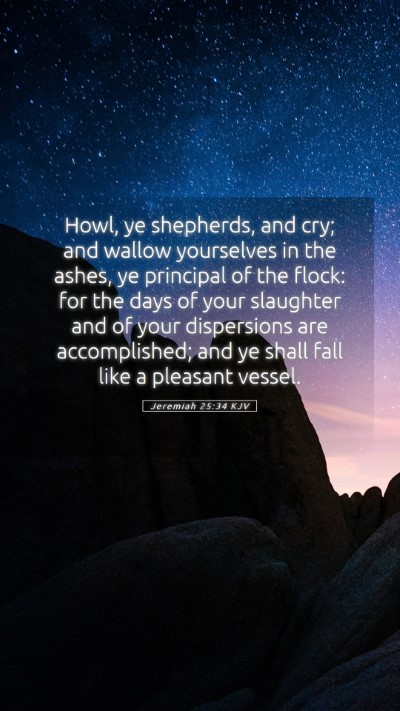Understanding Jeremiah 25:34
Verse Text: "Howl, ye shepherds, and cry; and wallow yourselves in the ashes, ye principal of the flock: for the days of your slaughter and of your dispersions are accomplished; and ye shall fall like a pleasant vessel." (Jeremiah 25:34)
Summary of the Verse
This passage highlights the impending judgment and destruction that will befall the leaders of Israel, metaphorically referred to as "shepherds." The call to "howl" and "cry" indicates a deep lamentation for the consequences of their actions, as they face the reality of their spiritual failures and the divine judgment that follows.
Bible Verse Meanings and Interpretations
In providing a balanced understanding of this verse, it is essential to draw from various public domain commentaries:
- Matthew Henry's Commentary:
Henry emphasizes the sorrow of the shepherds, noting that their leadership has led to disaster. The shepherds, representing leaders and priests, are to mourn over their people's destruction as they will experience the consequences of leading them into sin.
- Albert Barnes' Notes:
Barnes characterizes the "pleasant vessels" as a metaphor for those who are now doomed, suggesting that what was once of value in God's sight is now rendered worthless due to their unfaithfulness. He conveys a sense of urgency in the shepherds' cries for an impending calamity.
- Adam Clarke's Commentary:
Clarke interprets the distress of the shepherds as a reflection of their own sadness for their roles in leading the flock astray. He notes that the "ashes" symbolize mourning and repentance, implying that genuine leaders should weep for the ruin that their failure to guide rightly has caused.
In-depth Analysis
This verse serves as a poignant reminder of the grave responsibilities held by spiritual leaders. The imagery of shepherds and their flock draws from biblical tradition, positioning leadership within the context of care, guidance, and accountability. The impending judgment calls attention to:
- The nature of divine judgment: God's judgment is certain for unfaithful leaders who mislead His people.
- The theme of lamentation: Genuine grief is portrayed as both necessary and appropriate response to tragedy, emphasizing the emotional weight of leadership.
- The inevitable consequences: Actions have repercussions; leaders must be vigilant, as their faithfulness (or lack thereof) directly affects those they lead.
- The significance of repentance: This passage hints at the need for genuine mourning and acknowledgment of faults as a step towards redemption.
Application of the Verse
The significance of Jeremiah 25:34 transcends its historical context, offering valuable lessons for modern audiences:
- For Bible study groups, this verse can prompt discussions on the responsibilities of spiritual authority.
- Online Bible study sessions can utilize this scripture as a starting point to explore the intricate relationship between leaders and their communities.
- Church teachings may draw from this passage to encourage leaders to model genuine pastoral care and lament over sin and its consequences.
Cross References
Related passages that illuminate the themes presented in Jeremiah 25:34 include:
- Ezekiel 34:10: A passage where God obligates Himself to judge the shepherds of Israel.
- Jeremiah 23:1-4: A rebuke to the shepherds of Israel, reassuring God's people of His future restoration.
- Matthew 23:37: Jesus' lament over Jerusalem reflects a similar theme of mourning for the lost.
Conclusion
Jeremiah 25:34 offers profound insights into leadership, accountability, and the necessity of lamentation for sin, providing a framework for understanding spiritual authority within the context of divine judgment. As we engage with this verse, we gather valuable Bible study insights and learn the importance of faithful conduct in spiritual leadership.


